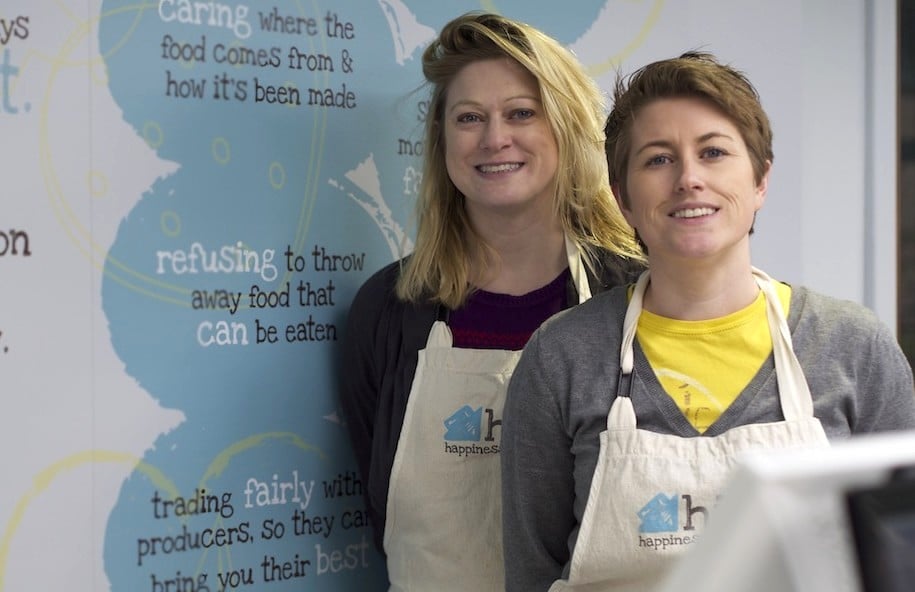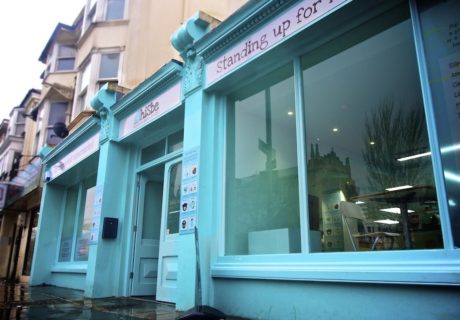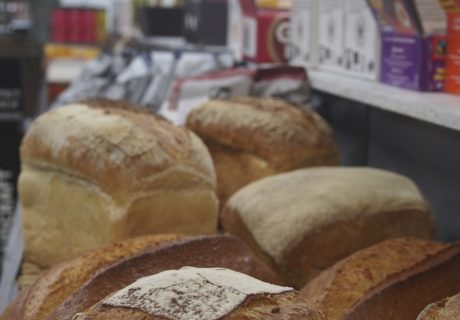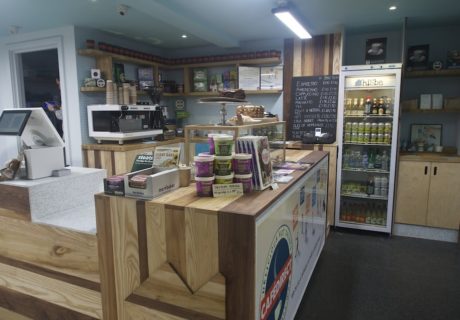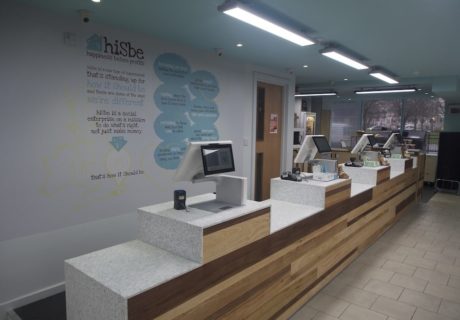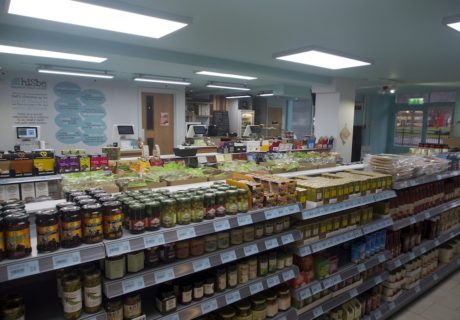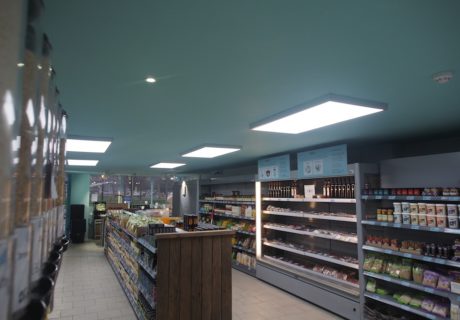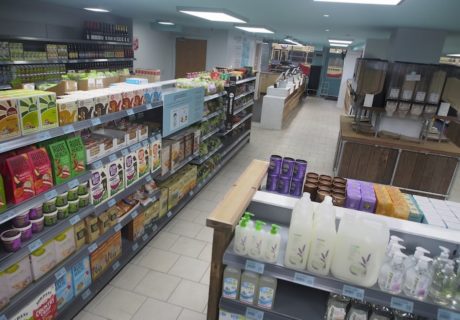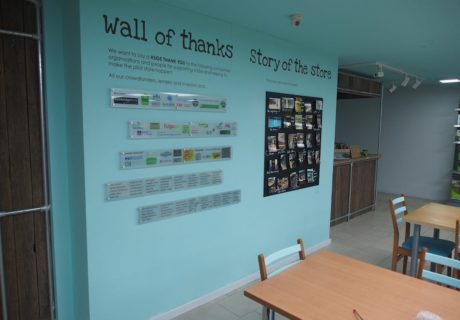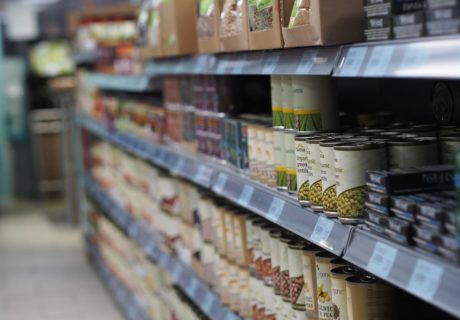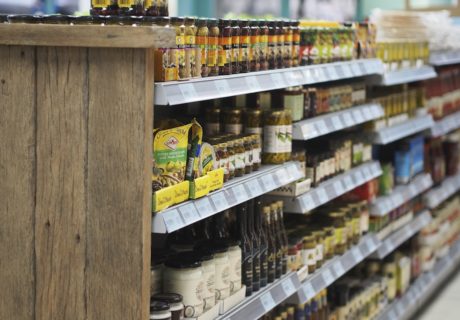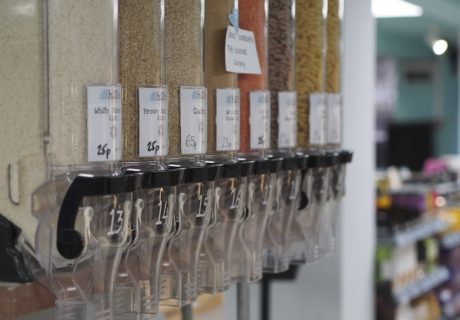Natural Products editor Jim Manson has been to see how new Brighton-based ethical supermarket hiSbe is showing how food retailing should be
‘Happiness’ and ‘supermarkets’. Two words you don’t often see together.
But that could all be about to change with the launch of Brighton-based ethical supermarket hiSbe.
Standing for ‘how it should be’, hiSbe is a social enterprise on a mission to do what’s right. Co-founders, sisters Amy and Ruth Anslow, say hiSbe is about more than making money – it’s about creating a fairer business model for retailing food. And they believe putting happiness first is a route to a more responsible, fair and sustainable food industry.
For two years now hiSbe has been operating as a self-funding CIC (Community Interest Company), shining a light on the food industry and championing food campaigns.
Last month, the first hiSbe food store – billed as a ‘pilot store’ – opened for business.
Fundraising for the store began in April. Through a combination of crowd-funding, share sales and small loans from individuals – along with financial support from ethical bank Triodos and Body Shop co-founder Gordon Roddick – a target of £200,000 was raised to build and stock the Brighton store.
Not another health store
The hiSbe website (www.hisbe.co.uk) points out that the new shop is “not another health food or wholefood store”. But walking around the new 3,000 sq ft shop floor I find myself instantly at home among all the natural, organic and Fairtrade brands. So, what is hiSbe’s positioning in the retail mix? It’s the first question I put to Amy Anslow when she gives me a tour of the shop.
“We’d call ourselves an independent supermarket, standing up for how is should be. There have been lots of issues with the big four supermarkets in Brighton and my guess is that a lot of people in the city will have had their fill of them. It’s the supermarkets we want to take business away from. To do that we need to sell normal, recognisable products that people on average budgets and everyday diets buy. But we’re also about affordable food that is as local, healthy, natural, fairly traded, seasonal and as ethically produced as possible.
“It’s a balance in the end. But we feel we can’t be so health food or wholefood that we’re unable to offer people a sensible range. We’re trying to it make easy for people to shop less at supermarkets.”
“It’s a balance in the end. But we feel we can’t be so health food or wholefood that we’re unable to offer people a sensible range”
Perhaps it’s no surprise then that hiSbe has the look and feel of a supermarket (with a few twists – the wood used around the store was reclaimed from Brighton’s Palace Pier, while the plastics surfaces at the stylish checkout are made from recycled yoghurt pots). The store layout will certainly be familiar to supermarket shoppers, so too the shelving, lighting and mainstream colour scheme. Shoppers will also find everything they need for a full family food shop, from fresh fruit and veg, to bakery and grocery; meat and dairy to household products, beer and wine.
So far, so recognisable. But differences become apparent as soon as you go through the door. Immediately facing you is an infographic explaining the ‘hiSbe way’. It’s an eight-point summary of the core values that underpin the hiSbe way of doing business – go local, pick seasonal, protect nature, support ethical, think welfare, save fish, consider waste, choose real.
Those eight choices, Anslow tells me, morphed into hiSbe’s buying policy. She explains how they translate at the shop floor level. Taking fruit and veg as one example, she says: “We source as much fresh fruit and veg as possible from local farms and smallholdings. A good proportion is grown here in Sussex. We prioritise seasonal where we can, and we support growers who are protecting nature. Some produce is organic but it’s a minority – our customers probably lean more towards local than organic. But we try to ensure everything is grown with care and on farms that avoid chemical inputs and are good employers.”
 Fruit and veg also provides an example of ‘consider waste’. “We don’t throw away anything that can be eaten. Just as one example, a couple of days ago we had some pears going soft. They were perfectly safe to eat, so we put them outside the shop with a sign saying ‘free pears’. It worked!
Fruit and veg also provides an example of ‘consider waste’. “We don’t throw away anything that can be eaten. Just as one example, a couple of days ago we had some pears going soft. They were perfectly safe to eat, so we put them outside the shop with a sign saying ‘free pears’. It worked!
One of the things that sets hiSbe apart from many wholefood stores, including near neighbour Infinity Foods, is that it stocks meat and fish. “We had a very long discussion about exactly how to position meat. But we think it will be meat eaters who ultimately change the food industry. So the priority has been to sell only meat that is raised and slaughtered in the most ethical way. It’s also all local – nothing from further than 26 miles from the shop.
“We’ve been challenged on a few occasions about whether we should be selling meat, but in the main people seem to be glad they can buy ethically produced meat that isn’t dyed bright pink.”
It’s not just locally reared beef, lamb and pork proving popular with hisBe shoppers, game is too – local partridge, pheasant and rabbit are on the shelves today. “You don’t get more free range,” says Anslow. Fish, she admits, is “a really complicated one”. To fulfil its ‘save fish’ goal hiSbe only stocks MCS certified fish and won’t sell anything on the IUCN Red List of Endangered Species.
Raising the ethical bar
Anslow says that all the branded lines hiSbe sells must perform well on the Ethical Consumer Index. This meant that trawling through the trade catalogues (hiSbe buys mainly through Suma, Infinity and Marigold – wholesalers whose values reflect its own) for the 3000 lines the new store would need was “a fantastically laborious task” – but an important one.
So how does hiSbe marry multiple ethical values, which usually come with a price, with its commitment to being affordable to people on average budgets? “The short answer? By being much more fluid and flexible with pricing than the supermarkets,” says Anslow.
And pricing is where hiSbe gets really interesting. To start with, all branded products are sold at below RRP. “RRP has been creeping up. You don’t have to make 40% or 30% to be a sustainable business,” says Anslow. HiSbe’s policy means that when compared to local supermarkets, or natural food stores, all branded products will be either “priced the same, slightly better or significantly better”.
“RRP has been creeping up. You don’t have to make 40% or 30% to be a sustainable business”
But keen pricing isn’t restricted to branded lines, as Anslow demonstrates by picking a large yellow pepper from the fruit and veg sectio. She weighs it. It comes in at 39p – not far off half the price you might pay in some supermarkets.
Affordability is behind the decision to offer such a good selection of everyday grains, seeds, pulses, pastas and nuts in dispensers. “It means people can buy as little, pasta, rice or lentils as they need for 25p for 100g.” The dispenser area is a big attraction and there are plans to expand it.
Noticing the difference
Anslow says shoppers are already noticing a difference in pricing. “We’ve actually been challenged on it a few times. People have come up and asked if we’ve got the right price on something!
hiSbe is doing a number of creative things in store to help keep down the prices of food staples. It rents out specially designed pods on the shop floor to local ethical businesses offering prepared foods, or trialling new products. And it has partnered with CafeDirect, who designed and part-funded the store’s coffee bar. “There’s such a high margin on takeaway coffee that we can still be competitive on pricing and use that still high margin to help keep prices down elsewhere. We’re not so worried about being cheaper on things like cleaning products, it’s more important to do that on everyday foods.”
hiSbe also stocks a moderate size range of beers and wines. “Booze made us nervous. We wondered if we could be competitive at all. But we’ve got organic and Fairtrade wines from £6.50 and beers at under £2.” The beers are proving good sellers and to celebrate the store will soon be adding a locally-brewed hisBe beer to the shelves.
Where prices are higher there is a good reason, which the store explains to shoppers. “Our meat is more expensive than supermarket meat. But it’s something where you’re not comparing like with like. It’s better quality, it’s local and it’s been ethically reared. But for things like bacon, sausages and mince are prices really aren’t any different to their supermarket equivalents – and we’re proud of that.”
London Road calling
hiSbe is sited on Brighton’s London Road. It may only be a couple of streets away from the city’s epicentre of alternativeness, North Laine, but it has a very different atmosphere. It’s a grittier neighbourhood, ‘up for redevelopment’.
“We did a lot of detailed research into store location. London Road, where we’re is a mixed area and it’s taken a bit of rap. But I think that’s unfair – and wrong. We were lucky enough to have been given access to software used by one of the major multiples, and that there is a weekly food shopping spend of £550,000 within a half mile radius of the store. We’re confident we can take 2.7 per cent of that.
“We think it’s a good area for us with lots of potential for the future too. There’s a high student population and there are some big redevelopment plans. We’ll be starting to do some advertising in February. Up till now we’ve worked social media very hard and it’s worked really well for us.”
It’s clearly very early days for hiSbe. But how has the new store performed in its first few weeks?
“It’s been a good start. We set targets for customers per hour and average customer spend. We’ve seen more customers than projected, but spend is a little less. But we are where we need to be. People locally are really behind what we’ve set out to do. And we want to be an authentic community store for them.”
Ultimately, hiSbe’s ambitions are bigger than owning a food store says Anslow: “A food store is a great place to start. The bigger dream is to create a brand that stands up for how it should be and makes it easy for people to use their shopper power to build a better, fairer and more sustainable world.”
Main picture: HiSbe co-founders, Amy (left) and Ruth Anslow


